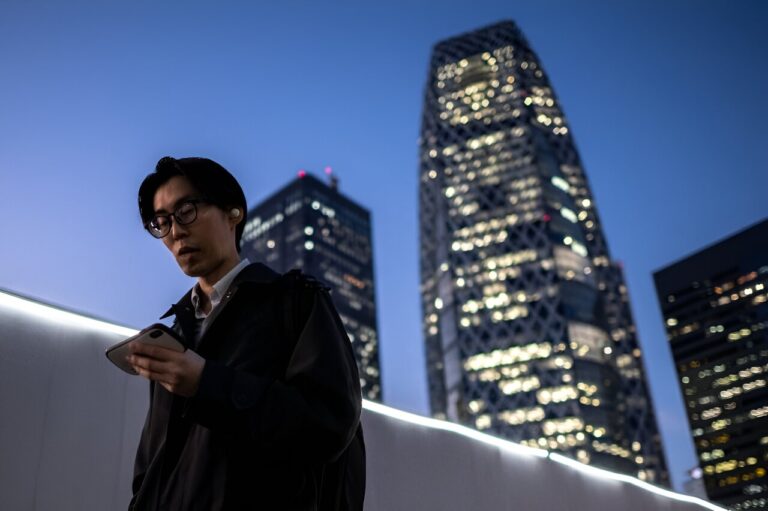× close
Microsoft plans to provide AI training to 3 million people in Japan.
Massive domestic and foreign investment gives Japan a chance to regain the technology crown, but experts say it needs to embrace rapid innovation to become a viable alternative to China.
U.S. tech giants are pouring billions of dollars into artificial intelligence, cybersecurity and chip production in Japan, which dominated the hardware industry in the 1980s.
Google launched a regional cyber defense hub in the country last month, and Amazon Web Services is spending $14 billion to expand its cloud infrastructure in Japan.
And in the latest move, this week Microsoft, a partner of ChatGPT maker OpenAI, pledged $2.9 billion to boost the country's AI capabilities.
“Geopolitical tensions have made Japan a more attractive and stable partner compared to China,” said Kos Erdene Bartalhou, CEO of Fintech Companies and Global. .
“Japan's technology sector, once a leader, has lost ground because it has been slow to adapt to digital and mobile trends compared to neighboring countries such as South Korea,” he told AFP.
But “now, with government support policies, resilient startups, and potential changes in the global technology scene, Japan has a chance to regain its technological edge.”
But that hasn't happened yet. In the latest global classification of digital competitiveness by Swiss management school IMD, Japan was ranked low at 32nd place.
And among the more than 1,200 high-tech “unicorns” (start-up companies valued at more than $1 billion) listed by CB Insights, only seven are Japanese.
Kos Erdene said this was partly due to a “perfection approach” among companies and a preference for “stability and gradual improvement.”
“Japan's traditional corporate culture tends to be risk-averse and hierarchical, which can stifle the rapid innovation often seen in the software industry.”
× close
Global tech giants are pouring billions of dollars into Japan's AI industry.
Microchip “Resurrection”
Masayoshi Son, CEO of Japanese technology investment vehicle SoftBank Group, warned that ignoring AI could leave the country a gaping “goldfish.”
“Wake up, Japan!” he said at a corporate event in October. “I want to be part of the evolution.”
Son and other tech titans, including Apple President Tim Cook and Amazon founder Jeff Bezos, attended a Washington dinner on Wednesday with Japanese Prime Minister Fumio Kishida and U.S. President Joe Biden.
At their summit today, Kishida and Biden pledged to strengthen their “shared role as world leaders in developing and protecting the next generation of critical and emerging technologies.”
The joint statement also agreed to “work with like-minded countries to strengthen the global semiconductor supply chain.”
Semiconductors, which power everything from cell phones to cars, have become a key battleground in recent years.
The United States and some European countries have blocked exports of high-tech chip technology to China over concerns about military use.
Meanwhile, Taiwanese semiconductor giant TSMC is facing pressure to diversify its production from customers and governments concerned about a possible Chinese invasion of the island.
TSMC opened a new $8.6 billion chip factory in southern Japan in February and is planning a second $20 billion facility for more advanced chips.
When Mr. Kishida visited the TSMC factory this month, he said, “I felt firsthand the revival of Japan's semiconductor industry.''
× close
Biden and Kishida said the United States and Japan are “world leaders” in next-generation technologies.
Japan has spent 3.9 trillion yen ($25 billion) on chip subsidies over the past three years, a larger share of its gross domestic product than the United States or Germany.
Japanese companies such as Sony and Toyota are also collaborating with US giant IBM on a semiconductor project called Rapidus, which aims to mass produce 2-nanometer logic chips in Japan from 2027.
“Crossroad”
Hideaki Yokota, deputy director of MM Research Institute, a think tank specializing in IT, said, “Now is the perfect time to invest in Japan,'' as the yen is at its lowest in 34 years.
He told AFP that while tech companies want the country to be “Asia's partner of choice”, the country has a large pool of highly educated engineers ready to join.
He said established Japanese companies, especially in the automotive and consumer electronics sectors, offer a real opportunity to make AI profitable.
However, Kos Erdene warned that given Japan's low labor productivity and shrinking workforce, Japan should not rely on its manufacturing traditions.
“As a CEO of a technology company, I see Japan at a crossroads,” he said, noting whether Japan can become “a producer and not just a consumer of these transformative technologies.” , said that the question is how quickly it can be achieved.
Microsoft plans to provide AI training to 3 million people out of Japan's 125 million people.
Japanese and American universities are also collaborating on new technology research programs, with funding from global companies such as Nvidia and Arm.
“Overall, Japan's AI efforts have great potential to revitalize the economy,” Kos Erdene said.
“By fostering collaboration, retaining top talent, and learning from successful models like the US and China, Japan can close the AI gap and re-establish itself as a major force in the global technology industry. I can.”


